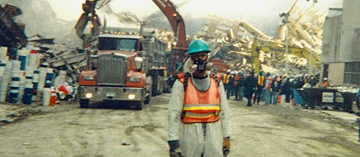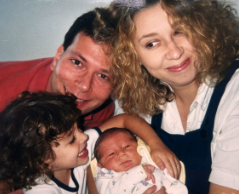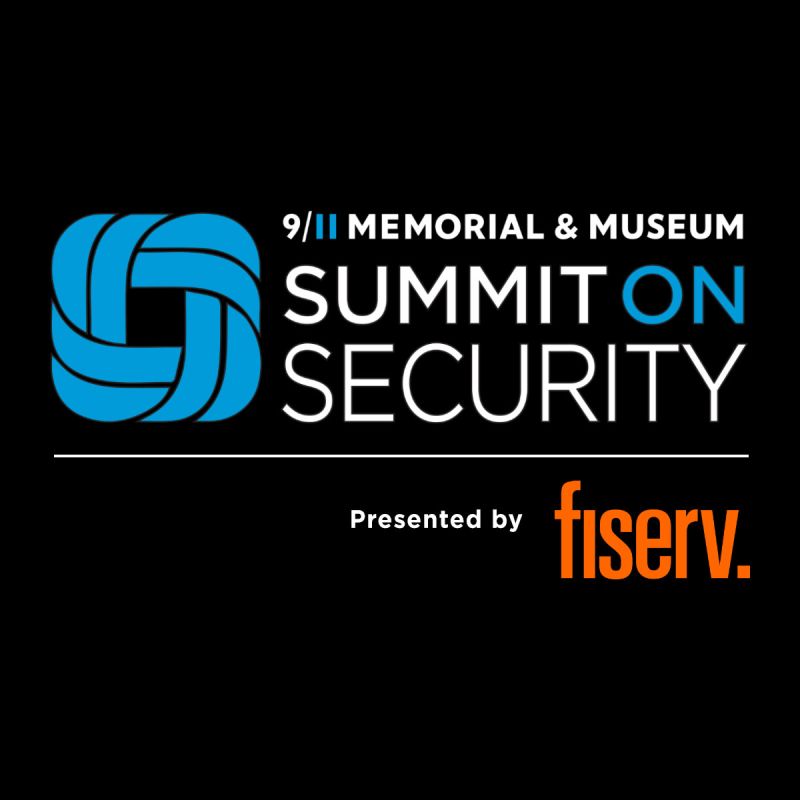Rescue & Recovery: In Their Own Voices With John Paluska
Rescue & Recovery: In Their Own Voices With John Paluska
- November 4, 2022

Paluska at Ground Zero, September 2001
Less than one week before the 9/11 attacks, Army veteran John Paluska was a rising college freshman in Iowa. The morning of the attacks — a mere six days into his first year at Fordham University — Paluska stood on the roof of his dorm and watched in horror as the second tower fell. Then he rode the subway downtown, where he ultimately spent almost a week volunteering with rescue and recovery efforts at Ground Zero. In this special Salute to Service installment of our Q&A series "In Their Own Voices," Paluska — who co-founded our Visionary Network in 2020 — talks about the role he played and how the experience inspired him to join the U.S. armed forces.
Where were you on 9/11?
I had just moved to New York from Iowa, and I was six days into my freshman year at Fordham University. In my dormitory, I woke up to hearing the news that the towers had been hit and I went to the top of my dormitory and witnessed the second tower fall. Immediately after learning that this was a terrorist attack, and the tragedy of the scene, I jumped on a subway and went downtown to Ground Zero. I took the D train down to 14th Street and walked until I arrived at Manhattan Community College which was two to three blocks north of the World Trade Center. Someone asked me if I was there to be part of the civilian military Response and I said I was there to help. I was asked for my next of kin, however, I didn’t know what that meant, so I gave them my Social Security number. We suited up with some boots and gloves — whatever tools we could find. Off I went into Ground Zero with a group of 30 to 40 other folks. Amongst us were union workers, air conditioner duct workers, iron workers, and military.
What role did you play in the rescue, recovery, and relief efforts?
I spent six days at Ground Zero and with a rescue and recovery team on the west side near where the North Tower was. I recovered about four bodies and helped pass along the remains of many other victims, many of which were draped with American flags and others in black or fluorescent orange body bags. In the later days, I ended up helping ironworkers with some of the welding duties and provided general help whenever it was needed.
Can you describe the bond between yourself and other recovery workers? How has this community impacted you?
The night before the 20th anniversary of the attacks while in a lower Manhattan bar, I met a group of guys, and we started chatting. One was an army commander who had also spent time at Ground Zero. He showed me photos and somehow remembered me! I hadn’t met with, or spoken with, anyone that I volunteered with until that evening, in fact I rarely talked with anyone about my time at Ground Zero, so it was the most touching experience, and I have met up with him three times since. The bond between fellow rescue recovery workers — whether it be those I worked for or those I worked alongside — and the 9/11 family members is indescribable. It is an infinite and powerful bond that we will never forget. We will always be there for each other. We continue to support the remembrance to honor the victims and it’s a mission that we will never let fail because of the lessons we learned from what happened on September 11, 2001.
What does May 30th mean to you?
I've made hundreds of friends after 9/11 that did so much more than me and that I have incredible respect for. The people of the 9/11 community inspire me to want to continue to provide more and continue giving more of myself. It’s a community full of heroes, respected authoritative figures, and families whose lives were horrifically changed forever who continue to mourn the huge loss. May 30th is an annual reminder of this. I stay motivated to help educate and bring remembrance to this younger generation.
Do you have any health issues connected to your time at Ground Zero?
In the weeks after Ground Zero, I ended up developing a postnasal drip and a cough that was relatively significant throughout my freshman year. In November, I went to an ENT doctor to get a chest X-ray. I went back in December. So, despite having only spent six days at Ground Zero, I do have some degree of complications from my short time at Ground Zero. Fortunately, it has not yet turned into anything of a serious nature.
Regarding the mental health aspects, I think I find solace in being around people who experienced what I experienced. I had been unable to tell my story in detail for 17 years because it was so hard for me to describe what I saw and what I did. It was traumatic for a kid who had just moved from Iowa — from a farm surrounded by cornfields — to see what I saw.
Why is it important to share your story and stories of others with the next generation?
9/11 was a target against humanity. The hardest part over 20 years later is connecting with those who were not born yet and conveying the impact and implications of that horrific day. The people who gave their lives on that day, and the heroes, in the immediate minutes and hours of the attacks, as well as the community that has come together over the years, showed that you can come back stronger. It shows that no act of evil will ever stop us from representing who we are, what we believe in, nor forgetting and honoring what we’ve been through.
In 2019, I co-founded the 9/11 Memorial & Museum Visionary Network as a way to connect with the next generation. It is up to us to carry on these stories of heroism and the memories of so many.
Teaching about the events and honoring those killed is still everyone’s mission. It is important to the 9/11 community to relay the significance of 9/11 and the work that was done, and what happened, because that day shaped the world as we know it.
Anything else you’d like to add?
Prior to 9/11, I had no intention of joining the military, but I had just served alongside some national guardsmen — folks who were wearing a uniform — and at 18 years old, was one of the youngest to volunteer at Ground Zero. A month after 9/11, I went and spoke to an Army recruiter about my options. I was put in the middle of this catastrophic event, and I was blindsided by the impact it had on me. I was so juvenile, and I had no idea how it would affect me to the point that I completely changed my career and life path.
I started basic training in April 2002. I later joined the Army ROTC at Fordham and was commissioned as an officer in 2005. I served in the United States Army until March 2017, when I was medically retired following injuries sustained from roadside bombs. As a Green Beret, I was deployed to many countries around the world. As a foreign training advisor, I gained a different understanding of the many different cultures, and the types of hardships people suffer. More than ever, I learned to appreciate the freedoms I have as an American and feel very fortunate to have been born in the United States.
Compiled by Government and Community Affairs Intern Daniella Semper
Previous Post
Powerful Memoir by Juliette Brisman Keeps Husband's Memory Alive

The recovery of Mark Brisman's wedding band in 2004 brought a part of him back to his family and reshaped their lives. His wife, now a motivational speaker and grief counselor, recounts their love story and the significance of that ring in her memoir "A Heart Returned."
Next Post
2022 Summit on Security Happening Now

The fifth annual Summit on Security, presented by Fiserv, is now on demand. View highlights from its discussions, including an impressive roster of experts who share meaningful insights as they delve into the ways we can all make companies, cities, and nations safer.